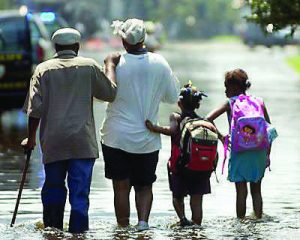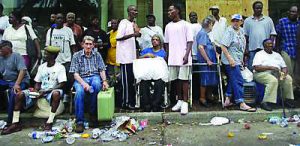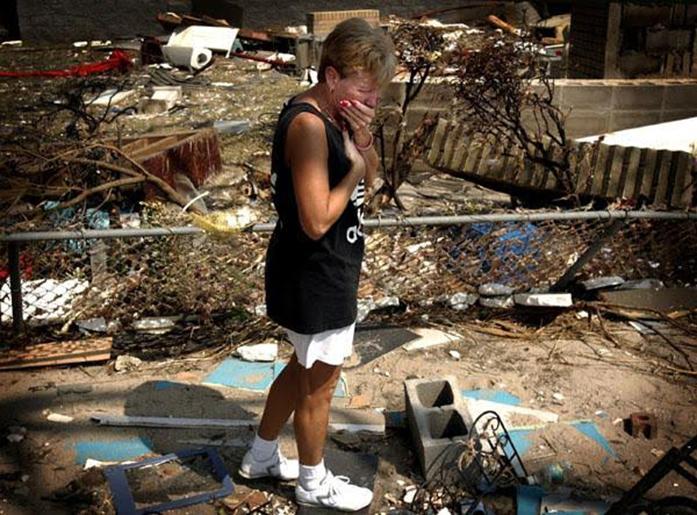Peter Teahen said he was caught by surprise when he was pulled out of Miami and sent to New Orleans to deal with a storm heading that direction.
The Cedar Rapids native and longtime American Red Cross volunteer said no one had expected Hurricane Katrina to become a Category 5 hurricane.
In late August 2005, the hurricane whipped through the lower part of the United States, causing damage in many parts of Southern states such as Florida, Mississippi, Alabama, Georgia, Louisiana and Texas. New Orleans saw the most damage because of a series of levee breaks, which caused the city to flood.
Ten years later, Teahen reflects on the days leading up to the devastating storm.
“She hit on a Wednesday,” he said. “Tuesday morning, I arrived in New Orleans and at that point we knew this was going to be a devastating, catastrophic hurricane.”
Teahen was the national spokesman for the American Red Cross at the time of Katrina. He appeared on many national newscasts the day before the storm, explaining to reporters what the Red Cross was expecting.
His last interview before Katrina hit was Wednesday morning. He remembers the news team realizing that the storm was coming, quickly.
“By the time we were done with that interview, they were in tears,” he said. “[They realized] people were going to die that day if they didn’t get out of New Orleans.”
Teahen headed to Biloxi, Mississippi, not far from New Orleans, to wait out the storm. He remembers the wind howling and the storm lasting for hours.
Ben and Jeri Halperin of Oxford, Iowa, were living in New Orleans during Katrina, both working and keeping busy. The two evacuated to a safer but still hard-hit area.
“It was just crazy,” Ben Halperin said. “Just high winds going first in one direction, then another direction. A tree came down where we were and landed on the porch, and it could’ve well gone through the roof.”
Both the Halperins and Teahen said it took nearly a month before they were able to get back into New Orleans because most of the city was under water. The Halperins came back to claim what little belongings were left of their submerged home.
Teahen stayed for four or five weeks to help with relief efforts, sleeping mostly in his car because there was nowhere else to go. It took him three weeks to find a bed to sleep in.
“Our purpose was to get to the clients … and figure out how they could be served,” he said. “It was a real stressful time for everyone involved.”
The clients Teahen worked with were distraught and left with nothing. He remembers talking to a young mother with four kids who had no diapers, no formula, no electricity, and no fresh water.

“The emotions we saw were sheer fear, numbness, and horror,” he said. “They’ve lost everything. Many of them didn’t know where their family members were. There was this real desperateness to ,‘Where is my family? Are they alive or are they dead?’ They were terrified of ‘What’s going to happen to me now?’ ”
However, despite the chaos, Teahen said, he also saw community begin to form.
In shelters, mothers clustered their cots together and took turns watching children for each other so people could shower or try to contact family. Older men grouped together and played cards to pass the time.
“Those powerful experiences between human beings that reach down into the most inner-core of your being and touch you and change you forever,” he said. “As a responder interacting with the clients we serve … it is a human experience that’s hard to describe. You know that when you’re standing there with these very powerful experiences that you’ll never be going home the same.”

University of Iowa freshman Nicholas Fraizer moved to New Orleans in early 2006 just months after Katrina devastated the area. He said he worried his peers would not accept him, knowing he could not fathom all they had just been through.
“I was scared,” he said. “I wasn’t as affected as other people in New Orleans were. After going to school for the first day, all my nerves were at ease. You could tell something happened, but their whole attitude on life was just go with the flow.”
Fraizer said the New Orleans community has continued to have that attitude since the storm. He said since his arrival, the city has gotten its spunk back, and he wants to continue to see it grow.



